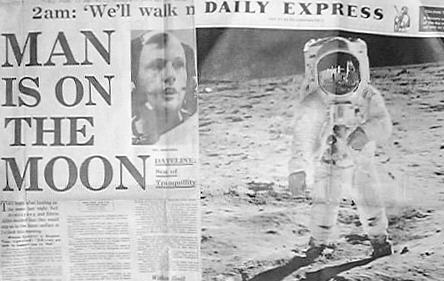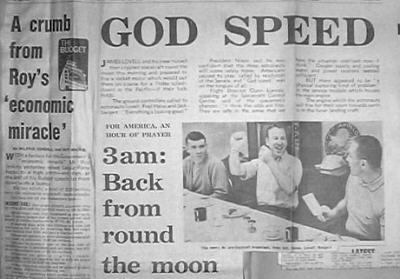|
The
30th anniversary [in 1999] of the first manned lunar landing reminded me
that I kept a scrapbook of the Apollo missions as a thirteen year
old. This scrapbook was gathering dust in the attic so I brought
it down and browsed through the many press cuttings that I kept.
|

|
|
A
1969 fading UK newspaper brings back some memories!
|
I
greatly enjoyed re-reading some of these accounts as they
happened, especially those on the later Apollo 13 mission, which
seemed much more involving than the recent 'looking back'
accounts in the media.
Whereas nowadays the teenager is
surrounded with technological wonders they probably take for
granted like video recorders and computers, this was not the case
in 1969. The compact audio cassette, pocket calculators and video
recorders were some years away.
Computers were large
mainframes and rarely seen by the public. 'Log' tables and slide
rules were the tools of the trade of the school student studying
science in the sixties and most of the seventies. So the space
race was probably held in much more awe then, than the almost
routine missions nowadays to dispatch ever more sophisticated
satellites and robot vehicles to far flung parts of the solar
system.
|

|
|
Despite
the Apollo 13 mission crisis, by 1970 lunar missions were no
longer full page news in the UK. The annual UK finance budget
(on the left) was also main news.
|
As
I browsed through the scrapbook I wondered how many youngsters
keep scrapbooks nowadays of the science and technology news that
makes the headlines. Compiling articles, photos, press cuttings
etc. can create something of historical value that in many years
time can provide a fascinating glimpse back for you, next
generations of your family or future school classes. They can
reveal not only the scientific stories of the time but how they
were received and impacted on peoples lives.
The other
stories in old newspaper cuttings can put headline news of the
time in perspective. For example, in the same UK paper heralding
the moon landing, there was a short piece on the launch of the
first do-it yourself pregnancy test kit in the US. Such test kits
are a commonplace item in drugstores nowadays, but interesting
how these were newsworthy at the time as well.
With the
advent of the Internet, home video recording etc. the 'paper
cuttings and glue' type scrapbook can be complemented and made
even more worthwhile with a 'multimedia scrapbook'. Video clips
and audio clips can be added to the 'scrapbook' as there is a
wealth of free information on the Internet or on TV programmes.
Subjects in the headlines now, that if compiled in a
scrapbook, could provide a fascinating glimpse back in thirty
years time when they may be commonplace. Some examples that
spring to mind are:
Genetically
modified food.
Cloning
of animals and possibly humans.
Exciting
new missions manned and unmanned to the planets.
The
controversy over whether extra-terrestial life has been found in
Martian rocks found on earth, or the recently found nanobacteria
in earth rocks.
The
search for new subatomic partices and the quest for a unifying
theory for the laws of nature.
So
why not compile a multimedia scrapbook of the news that makes you
go 'wow' (or creates controversy), just as it did for youngsters
like me thirty years ago?
|